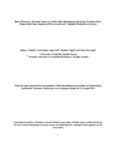| dc.description.abstract | Peri-urban areas play a major role in the supply of vegetables consumed in urban areas. In
order to meet high demand for aesthetic quality characteristics, peri-urban farmers use intensive
production practices characterized by use external inputs. This paper uses Means-End Chain
analysis approach to examine the role farmers’ personal values play in the decision to use soil
fertility improvement inputs namely, animal manures (organic fertilizer) and inorganic
fertilizers. It found that use of animal manures and inorganic fertilizers was driven by the need
to earn higher profit margins thus making more money in order to meet family needs. This in
turn met farmers’ personal values relating to, among others, happiness, leading a comfortable
life, independence and healthy life. The major implication of these findings was that farmers’
private goals could, with the urging of the market that demands unique aesthetic quality
characteristics, promote intensive applications of both the organic and inorganic inputs with
potential negative environmental consequences. | en_US |

